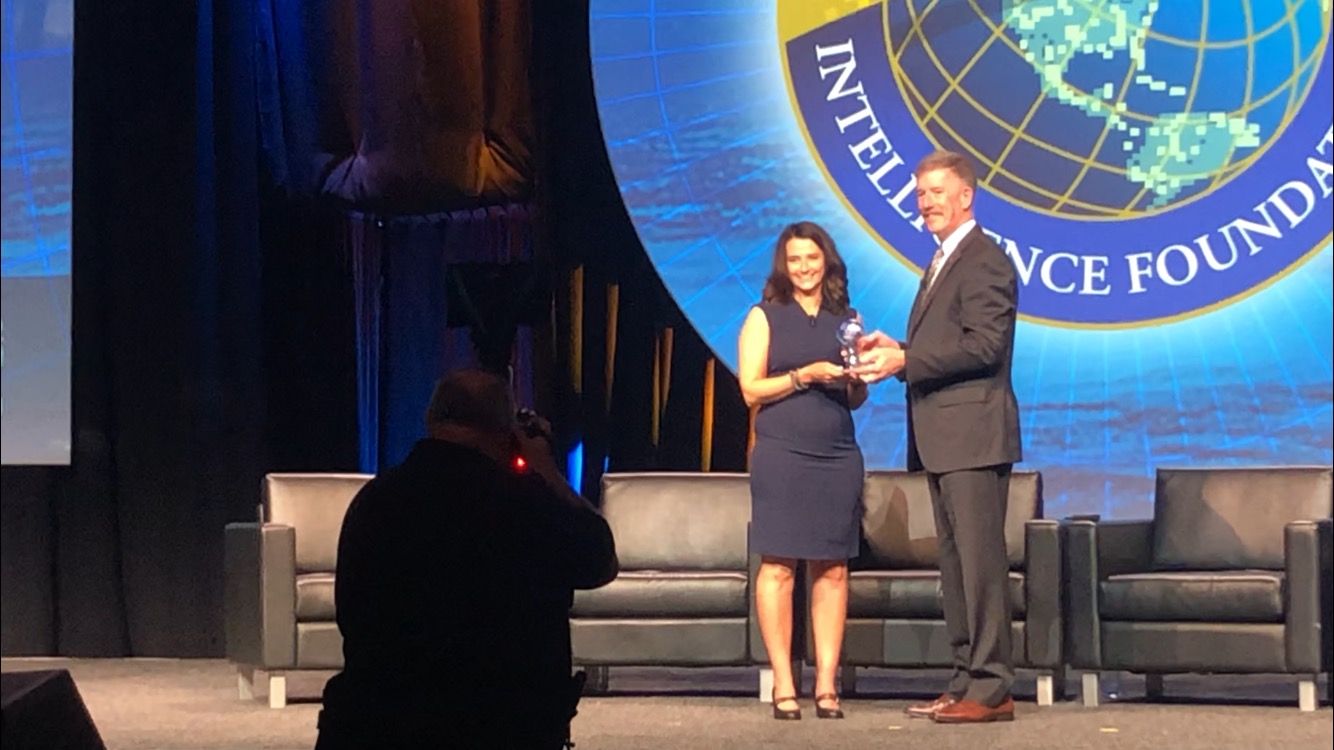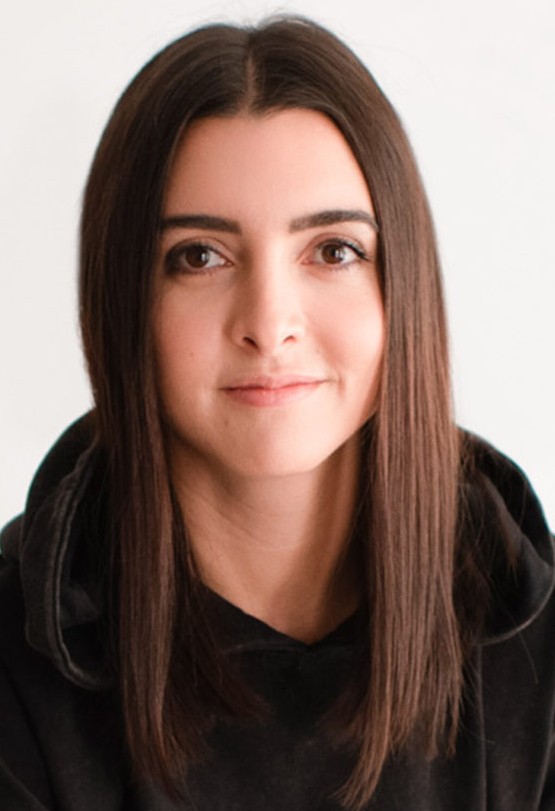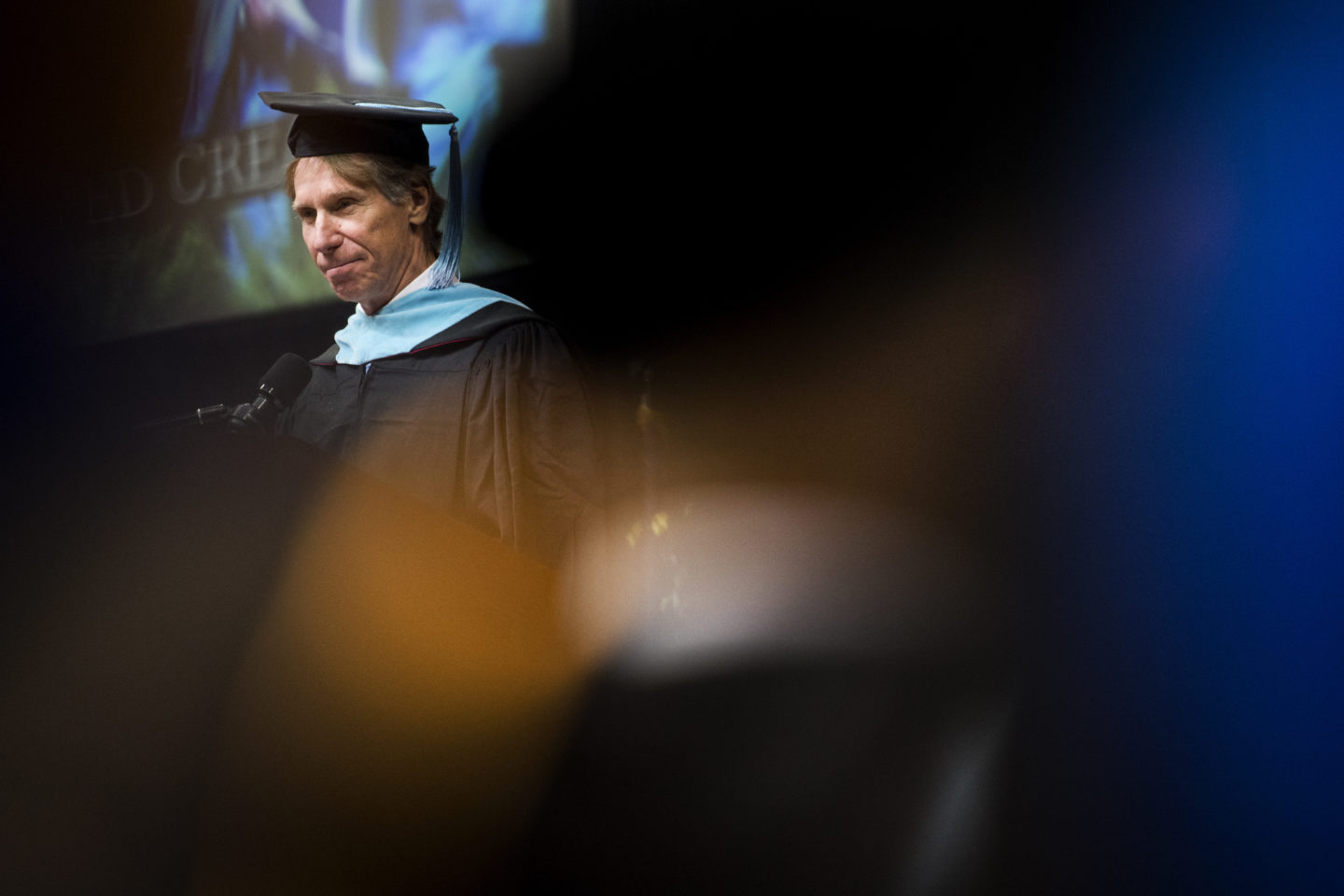CPS Student Helps Families In Need at St. Stephen’s
Latasha Scott is the middle school coordinator for the youth leadership corps at St. Stephen’s. St. Stephen’s is a non-profit organization that provides essentials such as food and cleaning supplies to local families in need.
Fighting Fire with Information
In California, Rachael Brady’s Northeastern master’s capstone has yielded an award-winning method for identifying arson.

On her 18th birthday, Rachael Brady (right, CPS ’16) stared through the windshield of her mother’s Hyundai at a steadily growing plume of gray smoke. The family was headed directly toward the ominous cloud, on their way to celebrate at Red Lobster on the east side of Redding, California, but they weren’t fazed.
“It wasn’t close enough to be afraid of,” Brady says. It was just a fact of life: “Summers in California, smoke columns in the air. It’s just one of those things. As common as snowstorms in Massachusetts.”
That fire, dubbed the Bear Fire because it had been sparked near Bear Mountain, burned out of control for five days in 2004, scorching 11,000 acres and destroying 80 homes. It had started when a local resident, disregarding fire warnings, had decided to mow his lawn in 106-degree August heat. For his carelessness, he was later convicted of arson and sentenced to four years in state prison.
More than a decade later, Brady would devise a method to reduce the number of such disasters—and to help authorities catch some of those responsible for them. She grew up in Redding, a city of about 92,000 nestled into the foothills of the Cascades at the northern end of California’s storied Central Valley. It’s a place where wildfires are a constant concern, and one she describes as “very rural” and community-minded.
“Where I grew up, one of the things when you got to be about 18 was you did some type of community service,” Brady says. “The day I turned 18 was the day the Bear Fire broke out, which was one of our more devastating fires around the Redding area, until last year and the Carr Fire. So that was how I got into it.”
She started as a volunteer at her local fire department, then applied for a job as a night dispatcher at the California Department of Forestry and Fire Protection, widely known as Cal Fire. She got the job, and she found she loved the industry and her colleagues at Cal Fire, and that she was good at staying calm while dispatching rescuers to help people in need. The hours, however, weren’t ideal.
“About three or four years in,” she says, “I found GIS. And I figured out the night shift was not where I wanted to spend my life.”
Brady’s introduction to Geographic Information Systems came when a Cal Fire captain nearing retirement handed her responsibility for managing the department’s Computer Aided Dispatch (CAD) system, a tool that uses layers of GIS data to help users map the best response routes in emergencies. As new data and technologies come online, the system requires continual upkeep to ensure that help arrives as soon as possible. New to GIS and CAD, and with little other technical experience, Brady plunged in.
“I teach GIS now to some of our new CAD people,” she says, “and I tell them, ‘I’ve been where you are.’ [For instance,] at first, I didn’t know that you could make a major road and a smaller road different colors. I lived in a black and white map for six months before somebody came along and said, ‘You know you can symbolize the roads, right?’ And I was like, ‘Wait, what?!’ But then I thought, ‘Well, what else can I do?’ And that’s kind of how I fell in love with it.”
The technology had captured her imagination, and she wanted to take it further. Based on her experience with GIS as a dispatcher, she gained a promotion—and a ticket out of the night shift—to Cal Fire’s Northern Region Office in Redding in 2013. Then, when she finished her bachelor’s degree in 2014 while working full-time, her husband suggested she continue her education. She searched the web, found the College of Professional Studies’ online offerings, applied and was accepted. Being able to complete the coursework remotely, she says, was critical.
“I think having the online option gives people who have an idea of what they want to do, or are already working, that opportunity to still do school, versus having to go to campus and be on-site,” Brady says. “I live in California. I would have had to move [to Boston] for two years. I’m married, and I have a job, you know? It just wouldn’t have worked.”
Brady’s coursework at Northeastern included classes on crime analysis and the use of open-source GIS software, as well as a “Crisis Mapping for Humanitarian Action” course in which she and other students used GIS technology to support relief efforts in Nepal following a devastating 2015 earthquake. What really brought her professional and academic worlds together, however, was her work on a capstone project with Professor Cordula Robinson, now a senior research scientist at Northeastern’s Kostas Research Institute. The idea for the project, which would crown Brady’s master’s degree in Geographic Information Technology, originated back in Redding.
“A couple of the chiefs and I were sitting around, probably about six months before I started the project,” Brady says, “and I said I need a good capstone project. It’s coming up. What are some ideas?”
They tossed a few thoughts around, and then someone suggested trying to find a way to identify cases of serial arson.
“I asked, ‘Well do you guys think we could identify serial arson using GIS?’” Brady says. “We all stared at each other. Then they said, ‘Well, that’s the question for you.’ And I said, ‘I think we could do it. I mean, it’s just human behavior—it should cluster. And that’s [something] GIS identifies. It identifies clusters. We should be able to make this work.’”
When Brady proposed the idea, Robinson saw its merit immediately, and in the months that followed, she provided expert coaching as Brady designed just such a system. As part of the testing process, Brady’s boss at Cal Fire had given her data on many past fires. Some had already been identified and adjudicated as serial arson cases, while other data described fires caused by lightning strikes, discarded cigarettes and other natural or accidental ignitions. Brady wasn’t told which were which.
“I really liked what her boss did,” Robinson says. “Rachael had to do her analysis and then go back and say, ‘this is where I suspect there is serial arsonist behavior, based on the patterns that we’re seeing in these data, and this is where I don’t think we are seeing serial arsonist behavior.’ Her boss looked at her work and found that there was a really high correlation.”
After that proof of concept, Brady was set loose on real data. Her analysis combined GIS with crime pattern theory (Brady also holds a certificate in crime and intelligence analysis) using techniques pioneered by Canadian criminologist D. Kim Rossmo. Whereas before, Brady says, between 30 and 50 fires would have to be lit before Cal Fire could conclude there was an arsonist at work, her innovative application of GIS has brought that number as low as 10.
“Our reaction times are getting better,” she says.
The results in her first year were eye opening.
“We had had three serial arson arrests in 2015 already,” Brady says, “So we had the data set, and we knew there were three already in there that we could easily identify as a baseline of whether we were on the right path or not. So, we ran the analysis. The system pulled out the serial arson groupings that we knew about already, but it also identified a bunch more.”
Stakeouts ensued, cameras were placed in areas of suspicion, and arrests soon followed. At least one suspect later pleaded no contest to setting four wildfires. In the years since, other cases have been opened, and Brady has been called to testify as an expert witness, preparing maps for courtroom exhibits and explaining her work to juries. She was recognized in June by the United States Geospatial Intelligence Foundation (USGIF), which honored her with its Government Achievement Award, and the most recent conviction stemming from her analysis was secured in October, when another California man was sentenced to nearly seven years in prison for lighting a series of fires.
For Brady, success in identifying the patterns of serial arsonists has been the culmination of a professional passion. It has also meant a boost in her career. In February, she was promoted to the role of Research Data Specialist. Officials from Cal Fire’s southern region have begun to embrace her approach, and in January, for the first time, she will have the opportunity to analyze data from the entire state of California. She also believes the techniques she has developed hold the promise of putting even more powerful tools in the hands of fire and law enforcement officials at a time when the imperative to stop fires before they start is more urgent than ever.
“One of the next questions that I want to see if GIS can answer is, can we predict where the offender will next light their fire?” Brady says. “We never know where the next one’s going to be, but that’s the next step. We’re always working backwards, and I want to try to work forwards. Can it be predictive? If I know what your pattern is to this point, can I take that and feed it in and have it tell me where you’re most likely to do it next?”
Ventilators are in short supply. So are the people who know how to use them.
Ventilators are incredibly complex machines, which is one reason manufacturers had trouble producing them quickly at the beginning of the pandemic. But now, another shortage looms: the people who know how to use them.
In this episode of the News@Northeastern podcast, Tom Barnes, a registered respiratory therapist and lead faculty member for the Master of Science in Respiratory Care Leadership at CPS, talks about the growing need for highly qualified respiratory therapists. Northeastern has recently launched an online Associate to Master’s pathway in Respiratory Care.
CPS Student Helps Create Website to Thank Frontline Workers

The COVID-19 pandemic has thrust healthcare workers, first responders, and other essential employees to the front lines. In response, people have come up with many creative ways to express their gratitude, such as lighting iconic buildings in bright blue and showering workers with flower petals.
Ariella Sharf, who graduated from Northeastern with a Bachelor’s in Psychology in 2015 and is currently pursuing a Master’s in Project Management from CPS, has helped develop another way to thank those on the front lines: 6FTCloser, a website that collects nominations and delivers personalized thank-you messages to essential workers.
Celebrating our Newest Graduates– Virtually
The college celebrated the achievements of undergraduate and master’s graduates in a virtual recognition ceremony on May 15. Watch highlights from the ceremony below, and click here to watch the full ceremony, which includes candidates’ personalized messages and photos as well as messages from faculty members. Congratulations to our newest graduates!
Mary Loeffelholz, Dean of the College of Professional Studies, welcomes students, families and friends to the virtual recognition ceremony.
David Fields, Senior Associate Dean, Academic and Faculty Affairs and Professional Programs, introduces this year’s student speakers.
Anh (Ann) Doan and Tien (Tiffany) Nguyen, this year’s student speakers, discuss their career goals and how the college has helped them on their journey to create a start-up that supports women’s development.
Dave Hagen, Associate Teaching Professor, announces this year’s Excellence in Teaching award winners: Dr. Margaret Gorman and Dr. Wendy Crocker.
Dean Loeffelholz introduces the recognition ceremony speaker. Speaker of the Massachusetts House of Representatives, Robert DeLeo, AS’72, gives his address to graduates.
Dean Loeffelholz introduces the ceremony’s alumni speaker. Clifford Harrison, CPS’15, addresses graduates as this year’s alumni speaker.
Congratulations to all of our newest graduates! Click here to watch the full ceremony, which includes graduates’ personalized messages and photos as well as individual messages from faculty members.
Virtual Mindful Monday Event: April 27, 2020
Mindful Monday Series Presents Listen, Connect, Learn, and Grow Together: Workplaces Response to this Global Crisis
Join us as we explore our workplace responses to this global crisis led by GSE faculty member Wendy Crocker, Lindsay Portnoy and Quannah Parker-Gowan.
Date and time: Monday, April 27, 2020
2:00 – 3:00PM EDT
Registration through SAIL is required.
Register here
Fear Can Be Contagious. Here Are Some Ideas For Keeping Calm.
Fear of a contagious illness can itself be contagious, says Kristen Lee, a licensed social worker who teaches behavioral science at Northeastern’s College of Professional Studies. But there are ways to keep your anxiety in check.
Important COVID-19 Update for International CPS Students
Northeastern is closely monitoring the current 2019 novel coronavirus (COVID-19) outbreak and is in constant communication with government and public health agencies on a global scale to learn from and carefully follow their recommendations.
Safeguarding the health and safety of the global community of students, faculty, and staff is Northeastern’s number one priority. The university is currently engaged in extensive contingency planning to prevent any disruption to student learning and to ensure business and educational continuity across all our global campuses and learners.
We understand our incoming international students are anxiously planning to arrive for our Summer Quarter 2020 to start their Northeastern experience at the College of Professional Studies. We foster an environment that is welcoming, inclusive, and supportive to all members of our global community, and we empathize with the disruption the current epidemic has caused to your learning plans and travel restrictions that will delay arrival to our campuses.
During this unexpected situation, we are offering our Northeastern learning experience in a fully online modality for all our degree programs. You may choose to start your degree program online even if you are unable to arrive to campus in time for the official start of the Summer Quarter (Term). After travel restrictions have been lifted, you will be able to transfer to one of our campus locations in the next available academic quarter, with minimal disruption to your study plan.
You may also choose to delay your enrollment and start date at Northeastern to a later term. To request deferred admission, please contact us by phone or email.
We believe these solutions will allow our incoming students to move forward with their study plans at Northeastern University. We will continue to monitor this developing situation and keep our students updated. For the latest university information regarding the coronavirus, please visit news.northeastern.edu/coronavirus.
For any support, questions, or clarifications, please reach us at +1-877-668-7727 or fill out a form.
‘All Progress Scrapes and Claws Before It Glides and Soars’
by Greg St. Martin —

Forty years ago, Billy Starr founded the Pan-Mass Challenge, a charity bike ride across Massachusetts that raises money for cancer research. He said that a 400-mile hike on the Appalachian Trail and a 120-mile bike ride a couple of years earlier had helped him to discover what he wanted to do with his life: build a business that “serves a vast public need.”
On Friday, Starr urged graduates of the College of Professional Studies at Northeastern to find a way to nurture their own most fervent interests in life.
“Find a way somehow, utilizing all the skills and knowledge that you have acquired, to nurture that passion and maintain it as a central driving force in your life,” said Starr, who served as the graduation speaker at a ceremony for students who earned their bachelor’s and master’s degrees this year. “That pursuit does not come with guarantees. But I stand before you as a testament to its uniquely, exhilarating power on the path to success and happiness.”
Starr, who earned his master’s in education from Northeastern in 1978, traced back his job today as the executive director of the Pan-Mass Challenge to the early 1970s, when his mother, uncle, and cousin died of cancer. He also shared how the death of a rider in the fifth year of the event challenged him, recalling how he struggled to cope with the tragedy and pain that it caused the rider’s family.
But Starr said he never doubted the mission of his organization. Over the past 40 years, nearly 200,000 cyclists and volunteers have participated in Pan-Mass Challenge, and $654 million has been donated to the Dana-Farber Cancer Institute.
“Triumph and tragedy often walk hand in hand,” Starr said. “To cope efficiently, it is essential that you have a clear grasp of who you are and why you set out on a particular path.”
Starr congratulated the graduates for earning their degrees. He told them to remember that most success is born of failure, and that “all progress scrapes and claws before it glides and soars.”
“That is why having a genuine passion for your work is so vital,” he said. “It is what keeps you going in the face of the inevitable obstacles on the road ahead.”
In opening remarks, Mary Loeffelholz, dean of the College of Professional Studies, told graduates that they represent “Northeastern’s global network of learners.” She said many students had earned their degrees online and through the university’s network of campuses in Charlotte, North Carolina; Seattle; the San Francisco Bay Area; Toronto; Vancouver; and London.
“You graduate already having begun to build a national and global network of your own making,” Loeffelholz said. “You have experienced learning without boundaries.”
Loeffelholz highlighted the diversity and accomplishments of the graduating class. She asked graduates to stand and be recognized if they had studied at Northeastern’s campuses outside of Boston, had come to Northeastern from another country, have served in the military, or attended the Lowell Institute School, through which students with previous college experience finish their bachelor’s degrees in the fields of science, technology, engineering, or business.
The College of Professional Studies offers 95 undergraduate, master’s, graduate certificate, and doctoral programs, many of which are available online or through a combination of online and in-classroom learning. More than 1,600 students from 42 states and 44 countries received bachelor’s, master’s, or doctoral degrees from the College of Professional Studies this year, including over 200 students who were recognized for receiving their doctorates at a ceremony on Thursday.
Philomena Mantella, senior strategic advisor to the president at Northeastern, told the graduates that their education has positioned them well for a “lifetime of growth, discovery, and learning.”
“Learning will never cease, nor will your relationship with your university and those who comprise it,” Mantella said. “As you continue to grow, we are here to remind you that the Northeastern network will always be accessible to you.”
In addition to the graduates, Friday’s ceremony honored professor of the practice Baktybek Beshimov and assistant teaching professor David Hagen for receiving the college’s 2019 Excellence in Teaching Award.
To see more pictures from the college’s 2019 graduation, visit the photo gallery.
Graduation Speaker is Billy Starr ’78, Founder and Executive Director of the Pan-Mass Challenge

Billy Starr founded and leads the Pan-Mass Challenge (PMC), a two-day charity bike-a-thon in which thousands of cyclists pedal up to 192 miles across the state of Massachusetts. The event, held the first weekend in August each year, has raised more than $654 million for Dana-Farber Cancer Institute in Boston, Massachusetts.
From its modest beginnings in 1980, the PMC is now the most successful athletic fundraising event in the country, with every dollar raised by cyclists directly supporting adult and pediatric cancer treatment and research.
Under Starr’s leadership, the PMC has grown exponentially over the last 39 years, proudly presenting a $56 million dollar gift to Dana-Farber in 2018, with a goal of raising $58 million during the 40th Ride Weekend in 2019. His commitment to raising funds for cancer research and patient care is rooted in his personal experience—his mother, Betty Starr, died at 49 of melanoma.
The organization’s mission is to provide Dana-Farber’s doctors and researchers with the necessary resources to discover cures for all cancers. With the commitment of more than 6,600 cyclists, corporate sponsors, individual contributors, and over 4,000 volunteers, the PMC increases its impact every year, having successfully aided in the development of new and innovative treatments.
Before starting the PMC, Starr was a newspaper reporter in Massachusetts and Colorado, worked in public relations, and was the squash coach at Babson College. He received his Bachelor of Arts from the University of Denver in 1973 and a Master of Education from Northeastern University in 1978. He was also awarded an honorary Doctor of Laws degree from Babson College in 1998 and honorary degrees from Bay Path College in 2008 and Salem State University in 2014. Starr is considered a pioneer of the athletic fundraising industry and consults on event programming throughout the country.
An avid cyclist, skier, and racquet player, Starr has ridden in his own event—the Pan-Mass Challenge—for all 39 years.
Photo credit: John Deputy